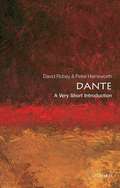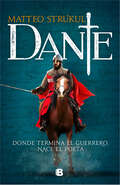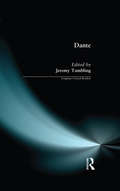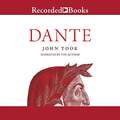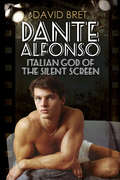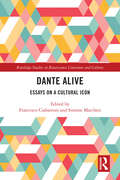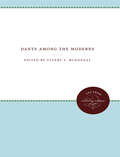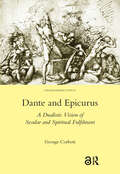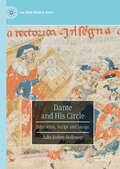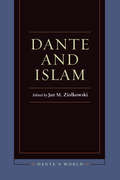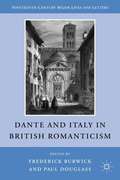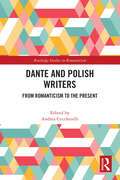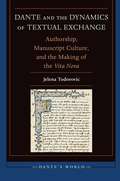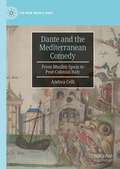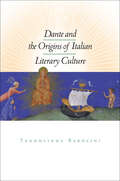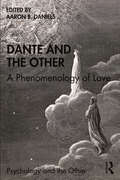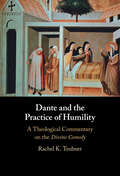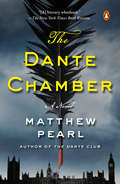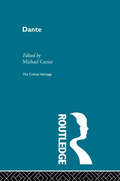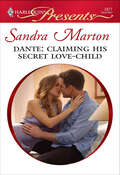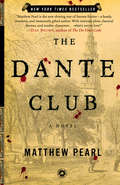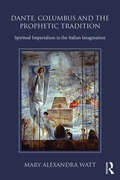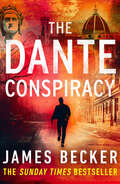- Table View
- List View
Dante (A Very Short Introduction)
by Peter Hainsworth; David RobeyThey emphasise the distinctive and dynamic interplay in Dante's writing between argument, ideas, and analysis on the one hand, and poetic imagination on the other.Dante was highly concerned with the political and intellectual issues of his time, demonstrated most powerfully in his notorious work, The Divine Comedy. Tracing the tension between the medieval and modern aspects, Hainsworth and Robey provide a clear insight into the meaning of this masterpiece of world literature.
Dante: Monarchy
by Prue ShawThis is the first new translation for forty years of a fascinating work of political theory, until now only available in academic libraries. Dante's Monarchy addresses the fundamental question of what form of political organization best suits human nature; it embodies a political vision of startling originality and power, and illuminates the intellectual interests and achievements of one of the world's great poets. Prue Shaw's translation is accompanied by a full introduction and notes, which provide a complete guide to the text, and places Monarchy in the context of Dante's life and work.
Dante
by Matteo StrukulUna apasionante narración de la mano de Matteo Strukul acerca de los oscuros acuerdos políticos y las confabulaciones por el poder de Florencia que marcaron la vida del joven Dante Alighieri. UNA ÉPOCA OSCURA MARCADA POR LA BARBARIE UN JOVEN DISPUESTO A DAR LA VIDA POR SU PUEBLO Y POR UN AMOR PROHIBIDO ESTA ES LA HISTORIA DE DANTE: GUERRERO, POETA Y LEYENDA 1288. La ciudad de Florencia está en manos del líder güelfo Corso Donati, un hombre cegado por el poder y sediento de la sangre de sus enemigos, los gibelinos. En este escenario oscuro y convulso vive Dante Alighieri, un joven valiente nacido en el seno de una familia güelfa y muy comprometido con las luchas políticas que asolan la región. Aunque Dante es un enamorado del amor, de la poesía y del arte, cuando el deber le llama a participar en la decisiva batalla de Campaldino, no le queda más remedio que demostrar su coraje y afrontar su propio destino en una lucha que marcará el curso de la historia de Italia y dejará una profunda huella en el corazón y en la vida del poeta. La conjunción del horror, las pesadillas que sufre consecuencia de la barbarie y el amor verdadero que siente por Beatriz serán las bases sobre las que comenzará a construir su obra magna, la Divina Comedia.
Dante: States Of Affect (Longman Critical Readers #18)
by Jeremy TamblingDante's work has fascinated readers for seven hundred years and has provided key reference points for writing as diverse as that of Chaucer, the Renaissance poets, the English Romantics, Tennyson and the Pre-Raphaelites, American writers from Melville through to Eliot and Pound, Anglo-Irish Modernists from Joyce to Beckett, and contemporary poets such as Heaney and Walcott.In this volume, Jeremy Tambling has selected ten recent essays from the mass of Dante studies, and put the Divine Comedy - Dante's record of a journey to Hell, Purgatory and Paradise - into context for the modern reader. Topics such as Dante's allegory, his relationship to classical and modern poetry, his treatment of love and of sexuality, his attitudes to Florence and to his contemporary Italy, are explored and clarified through a selection of work by some of the best scholars in the field. An introduction and notes help the reader to situate the criticism, and to relate it to contemporary literary theory. In this anthology, Dante's relevance to both English and Italian literature is highlighted, and the significance of Dante for poetry in English is illuminated for the modern reader.This book provides students of English literature and Italian literature with the most comprehensive collection of important critical studies of Dante to date.
Dante
by John TookAn authoritative and comprehensive intellectual biography of the author of the Divine Comedy For all that has been written about the author of the Divine Comedy, Dante Alighieri (1265-1321) remains the best guide to his own life and work. Dante's writings are therefore never far away in this authoritative and comprehensive intellectual biography, which offers a fresh account of the medieval Florentine poet's life and thought before and after his exile in 1302. Beginning with the often violent circumstances of Dante's life, the book examines his successive works as testimony to the course of his passionate humanity: his lyric poetry through to the Vita nova as the great work of his first period; the Convivio, De vulgari eloquentia and the poems of his early years in exile; and the Monarchia and the Commedia as the product of his maturity. Describing as it does a journey of the mind, the book confirms the nature of Dante's undertaking as an exploration of what he himself speaks of as "maturity in the flame of love." The result is an original synthesis of Dante's life and work.
Dante Alfonso, Italian God of the Silent Screen: Italian God Of The Silent Screen
by David BretDante Alfonso lives with his family in a small village in southern Italy until they learn of his affair with Roberto, the nephew of the local priest, and send him to live with relatives in New York City. Onboard the ship to America, Dante meets Jean-Paul, a French entrepreneur, and upon his arrival in New York City, they begin a relationship based on mutual benefits. Dante gets a job as a waiter at Harry's Place, a popular dance hall, and when Jean-Paul is arrested and deported, Dante moves in with Martin, a coworker, who soon becomes a lover. By way of a wealthy client, Dante gets an audition that earns him a bit part in a film from a major studio. In Hollywood of the early 1920s, Dante's star is rising, and he and his handsome publicist, Bob, who reminds him of Roberto, soon become lovers. As a movie star and heart-throb, Dante steadfastly refuses to submit to the pressure and dictates of the studio bosses who want him to marry to stop the rumors about his sexuality. Can a prejudiced Hollywood make him change who he is, or will he find a way to stay true to himself?
Dante Alive: Essays on a Cultural Icon (Routledge Studies in Renaissance Literature and Culture)
by Francesco Ciabattoni and Simone MarchesiThe essays collected here join in, and contribute to, the current reflection on Dante’s vitality today in a critical, multidisciplinary vein. Their intervention comes at a particularly sensitive juncture in the history of Dante’s global reception and cultural reuse. Dante today is as alive as ever. A cultural icon no less than a cultural product, Dante’s imaginative universe enjoys a pervasive presence in popular culture. The multiformity of approaches represented in the collection matches the variety of the material that is analyzed. The volume documents Dante’s presence in genres as different as graphic novels and theater productions, children’s literature, advertisements and sci-fi narratives, rock and rap music, video- and boardgames, satirical vignettes and political speeches, school curricula and prison-teaching initiatives. Each essay combines a focused attention to the specificity of the body of evidence it treats with best analytical practices. The volume invites collective reflection on the many different rules of engagement with Dante’s text
Dante Among the Moderns
by Stuart Y. McDougalIn this collection, eight distinguished critics of literature assess the nature and range of Dante's influence on the major British and American modernist writers. The indebtedness includes citation and allusion, imitation, parody, literary strategies, and a continuing dialogue between the modernists and Dante. The differences in response to this remote precursor clarify the development of each writer and highlight the multiplicity of literary stances among the modernists.Originally published in 1985.A UNC Press Enduring Edition -- UNC Press Enduring Editions use the latest in digital technology to make available again books from our distinguished backlist that were previously out of print. These editions are published unaltered from the original, and are presented in affordable paperback formats, bringing readers both historical and cultural value.
Dante and Epicurus: A Dualistic Vision of Secular and Spiritual Fulfilment (Italian Perspectives)
by George Corbett"Dante and Epicurus seem poles apart. Dante, a committed Christian, depicted in the Commedia a vision of the afterlife and God's divine justice. Epicurus, a pagan philosopher, taught that the soul is mortal and that all religion is vain superstition. And yet Epicurus is, for Dante, not only the quintessential heretic but an ethical ally. The key to this apparent paradox lies in the heterodox dualism - between man's two goals of secular felicity and spiritual beatitude - at the heart of Dante's ethical, political and theological thought. Corbett's full-length treatment of Dante's reception and polemical representation of Epicurus addresses a major gap in the scholarship. Furthermore the study's focus on fault lines in Dante's vision of the afterlife- where the theological tensions implicit in his dualism surface - opens a new way to read the Commedia as a whole in dualistic terms."
Dante and Epicurus: A Dualistic Vision of Secular and Spiritual Fulfilment
by George Corbett"Dante and Epicurus seem poles apart. Dante, a committed Christian, depicted in the Commedia a vision of the afterlife and God's divine justice. Epicurus, a pagan philosopher, taught that the soul is mortal and that all religion is vain superstition. And yet Epicurus is, for Dante, not only the quintessential heretic but an ethical ally. The key to this apparent paradox lies in the heterodox dualism - between man's two goals of secular felicity and spiritual beatitude - at the heart of Dante's ethical, political and theological thought. Corbett's full-length treatment of Dante's reception and polemical representation of Epicurus addresses a major gap in the scholarship. Furthermore the study's focus on fault lines in Dante's vision of the afterlife- where the theological tensions implicit in his dualism surface - opens a new way to read the Commedia as a whole in dualistic terms."
Dante and His Circle: Education, Script and Image (The New Middle Ages)
by Julia Bolton HollowayIn this book, Julia Bolton Holloway makes use of primary materials in documents, manuscripts and stone monuments in Florence, to place Dante's literary career in its rich context. Dante and His Circle discusses the encyclopaedic multicultural education in classical literature, law, ethics, rhetoric, diplomacy, poetry, music and cosmology Brunetto Latino gave to Guido Cavalcante, Dante Alighieri and Francesco da Barberino. Bolton Holloway traces Latino’s use of Arabic methods he had learned at the Court of Alfonso X el Sabio in Spain in 1260. Next Latino dictates his 'Rettorica', 'Tesoretto' and 'Tesoro' in Italian to his students, following the Sicilian Vespers, the manuscripts of their circle later coming to be re-edited, illustrated and published by Dante's fellow student, Francesco da Barberino, who survived them all and who likewise copied Alfonsine methods for producing the 'Danti del Cento' manuscripts of the 'Commedia'. The book ends by discussing Dante's Decolonialism. Each chapter provides Study Questions for further research.
Dante and Islam (Dante's World: Historicizing Literary Cultures of the Due and Trecento)
by Jan M. ZiolkowskiDante put Muhammad in one of the lowest circles of Hell. At the same time, the medieval Christian poet placed several Islamic philosophers much more honorably in Limbo. Furthermore, it has long been suggested that for much of the basic framework of the Divine Comedy Dante was indebted to apocryphal traditions about a “night journey” taken by Muhammad.Dante scholars have increasingly returned to the question of Islam to explore the often surprising encounters among religious traditions that the Middle Ages afforded. This collection of essays works through what was known of the Qur’an and of Islamic philosophy and science in Dante’s day and explores the bases for Dante’s images of Muhammad and Ali. It further compels us to look at key instances of engagement among Muslims, Jews, and Christians.
Dante and Italy in British Romanticism
by Frederick Burwick Paul DouglassFrom the artistic practice of improvisation to the politics of nationalism, the essays in this volume break new ground and significantly extend our understanding of the relations between British and Italian culture in its analysis of the reception of Dante and Italian literature in British Romanticism.
Dante and Polish Writers: From Romanticism to the Present (Routledge Studies in Romanticism)
by Andrea CeccherelliDante and Polish Writers: From Romanticism to the Present explores the phenomenon of Polish Danteism from a hermeneutic perspective. The chapters shed light on a series of “encounters” of eminent Polish writers with Dante and the Divine Comedy, resulting in original interpretations, creative reworkings, and a wealth of intertextual references testifying to a dialogue that has always been – and still is - alive, not excluding antagonism and bitter controversy. The contributors are all scholars of Polish literature with comparative expertise, teaching in Italian and Polish universities, which ensures a consistently focused point of view on the receptive context and the ways in which it is affected by the confrontation with Dante. The hermeneutic horizon ranges from the Inferno-like reading of the inhuman lands with which history abounds, to the metaphysical yearning underlying Dante’s “poetics of transhumanizing,” to recent perspectives related to the posthuman and storytelling.
Dante and the Dynamics of Textual Exchange: Authorship, Manuscript Culture, and the Making of the 'Vita Nova' (Dante's World: Historicizing Literary Cultures of the Due and Trecento)
by Jelena TodorovićDante and the Dynamics of Textual Exchange is the first book-length study to explore the question of poetry and genre in Dante’s Vita Nova (ca. 1292–1294). In paying particular attention to complex and multifaceted interactions between different cultures in Italy in the thirteenth century, this study illuminates the multicultural and plurilinguistic society transitioning from the feudal court to the modern city-state, advanced by the rising mercantile class. Working at the intersection of textual, material, and cultural elements, this study complements the current state of scholarship by providing information and answers informed by an in-depth analysis of the manuscript culture and its role in the birth and development of European vernacular traditions. Furthermore, Dante and the Dynamics of Textual Exchange expands the literature’s understanding of the dynamics between a text and its material support by looking at this relationship within a broader framework of intercultural exchange, which suggests an increased dynamics and fluidity between cultures.
Dante and the Mediterranean Comedy: From Muslim Spain to Post-Colonial Italy (The New Middle Ages)
by Andrea CelliIn recent decades the concept of Mediterranean has been cited with increasing frequency in relation to the study of medieval literatures. And yet, in what sense would Dante’s Comedy be ‘Mediterranean’? Is it because of its Greek-Arabic and Islamic sources? Dante and the Mediterranean Comedy analyzes the ideological function of references to the sea in the study of the Comedy undertaken by Enrico Cerulli, a scholar of Somali-Ethiopian languages, and a colonial governor of ‘Italian East Africa.’ Then it presents novel lines of inquiry on the reception and appropriation of the poem, such as the presence of Islamic sources in early commentaries of the Comedy, and cross-cultural allusions to Dante’s Hell in some graffiti on the walls of the Spanish Inquisition prison in Palermo. The image of the Mediterranean that seeps through the poem and through the history of its circulation is vivid yet hardly idyllic.
Dante and the Origins of Italian Literary Culture
by Teodolinda BaroliniIn this book, Teodolinda Barolini explores the sources of Italian literary culture in the figures of its lyric poets and its “three crowns”: Dante, Petrarch, and Boccaccio. Barolini views the origins of Italian literary culture through four prisms: the ideological/philosophical, the intertextual/multicultural, the structural/formal, and the social.The essays in the first section treat the ideology of love and desire from the early lyric tradition to the Inferno and its antecedents in philosophy and theology. In the second, Barolini focuses on Dante as heir to both the Christian visionary and the classical pagan traditions (with emphasis on Vergil and Ovid). The essays in the third part analyze the narrative character of Dante’s Vita nuova, Petrarch’s lyric sequence, and Boccaccio’s Decameron. Barolini also looks at the cultural implications of the editorial history of Dante’s rime and at what sparso versus organico spells in the Italian imaginary. In the section on gender, she argues that the didactic texts intended for women’s use and instruction, as explored by Guittone, Dante, and Boccaccio—but not by Petrarch—were more progressive than the courtly style for which the Italian tradition is celebrated.Moving from the lyric origins of the Divine Comedy in “Dante and the Lyric Past” to Petrarch’s regressive stance on gender in “Notes toward a Gendered History of Italian Literature”—and encompassing, among others, Giacomo da Lentini, Guido Cavalcanti, and Guittone d’Arezzo—these sixteen essays by one of our leading critics frame the literary culture of thirteenth-and fourteenth-century Italy in fresh, illuminating ways that will prove useful and instructive to students and scholars alike.
Dante and the Other: A Phenomenology of Love (Psychology and the Other)
by Aaron B. DanielsDante and the Other brings together noted and emerging Dante scholars with theologians, philosophers, psychoanalysts, and psychotherapists, bridging the Florentine’s premodern world to today’s postmodern context. Exploring how alterity has become a potent symbol in religion, philosophy, politics, and culture, this book will be of interest to many related fields. The book offers a thorough foundation in approaching Dante as proto-phenomenologist. It includes an informative review of literature, historical insight into Dante’s poetics-toward-ineffability as alternative to modern scientism, a foray into science fiction, existential elaborations, phenomenological analyses of Inferno’s Canto I, and applications to psychotherapy and qualitative research. It also contains a poem from an imagined Virgil retiring in Limbo, and a meditation on Dante’s complicated relationship to homosexuality. Dante and the Other presents the mystical passion of apophatic spirituality, the millennia-spanning Augustinianism of radical orthodoxy, Levinas, Heidegger, and many others—all driven by Dante’s Labors of Love. It is essential reading for Dante scholars, as well as readers interested in his works.
Dante and the Practice of Humility: A Theological Commentary on the Divine Comedy
by Rachel K. TeubnerIn this book, Rachel Teubner offers an exploration of humility in Dante's Divine Comedy, arguing that the poem is an ascetical exercise concerned with training its author gradually in the practice of humility, rather than being a reflection of authorial hubris. A contribution to recent scholarship that considers the poem to be a work of self-examination, her volume investigates its scriptural, literary, and liturgical sources, also offering fresh feminist perspectives on its theological challenges. Teubner demonstrates how the poetry of the Comedy is theologically significant, focusing especially on the poem's definition of humility as ethically and artistically meaningful. Interrogating the text canto by canto, she also reveals how contemporary tools of literary analysis can offer new insights into its meaning. Undergraduate and novice readers will benefit from this companion, just as theologians and scholars of medieval religion will be introduced to a growing body of scholarship exploring Dante's religious thought.
The Dante Chamber
by Matthew PearlMemories, fears, the fog of nightmares...Five years after a series of Dante-inspired killings stunned Boston, a politician is found in a London park with his neck crushed by an enormous stone device etched with a verse from the Divine Comedy. When other shocking deaths erupt across the city, all in the style of the penances Dante memorialized in Purgatory, poet Christina Rossetti fears her missing brother, the artist and writer Dante Gabriel Rossetti, will be the next victim. The unwavering Christina enlists poets Robert Browning, Alfred Tennyson, and Dr. Oliver Wendell Holmes to decipher the literary clues, and together these unlikely investigators unravel the secrets of Dante’s verses to find Gabriel and stop the killings. Racing between the shimmering mansions of the elite and the seedy corners of London’s underworld, they descend further into the mystery. But when the true inspiration behind the gruesome murders is finally revealed, Christina must confront a more profound terror than anyone had imagined. A dazzling tale of intrigue from the writer Library Journal calls “the reigning king of popular literary historical thrillers,” The Dante Chamber is a riveting journey across London and into both the beauty and darkness of Dante. Expertly blending fact and fiction, Pearl gives us a historical mystery like no other that captivates and surprises until the last page.
Dante Chr: The Critical Heritage (Critical Heritage Ser.)
by Michael CaesarFirst published in 1995. Routledge is an imprint of Taylor & Francis, an informa company.
Dante: Claiming His Secret Love-Child (Orsini Brides #2)
by Sandra MartonSecond in the series featuring irresistible, unstoppable Sicilian brothers—and the women who change their lives—from the USA Today–bestselling author.Gabriella Ramos-Viera fell for Dante’s raw masculinity and ended up pregnant and alone—with no choice but to return home in shame.Tough corporate raider Dante Orsini has set his sights on a huge Brazilian ranch. However, he discovers it’s to be inherited by Gabriella, the one woman he’s never been able to forget . . . But where’s the New York career woman he once knew? And who’s the dark-haired little boy who calls her Mommy?
The Dante Club
by Matthew PearlWords can bleed. In 1865 Boston, the literary geniuses of the Dante Club-—poets and Harvard professors Henry Wadsworth Longfellow, Dr. Oliver Wendell Holmes, and James Russell Lowell, along with publisher J. T. Fields-—are finishing America’s first translation of The Divine Comedy and preparing to unveil Dante’s remarkable visions to the New World. The powerful Boston Brahmins at Harvard College are fighting to keep Dante in obscurity, believing that the infiltration of foreign superstitions into American minds will prove as corrupting as the immigrants arriving at Boston Harbor. The members of the Dante Club fight to keep a sacred literary cause alive, but their plans fall apart when a series of murders erupts through Boston and Cambridge. Only this small group of scholars realizes that the gruesome killings are modeled on the descriptions of Hell’s punishments from Dante’s Inferno. With the lives of the Boston elite and Dante’s literary future in America at stake, the Dante Club members must find the killer before the authorities discover their secret. Dr. Oliver Wendell Holmes and an outcast police officer named Nicholas Rey, the first black member of the Boston police department, must place their careers on the line to end the terror. Together, they discover that the source of the murders lies closer to home than they ever could have imagined. The Dante Club is a magnificent blend of fact and fiction, a brilliantly realized paean to Dante’s continued grip on our imagination, and a captivating thriller that will surprise readers from beginning to end.
Dante, Columbus and the Prophetic Tradition: Spiritual Imperialism in the Italian Imagination
by Mary Alexandra WattExploring the diverse factors that persuaded Christopher Columbus that he could reach the fabled "East" by sailing west, Dante, Columbus and the Prophetic Tradition considers, first, the impact of Dante’s Divine Comedy and the apocalyptic prophetic tradition that it reflects, on Columbus’s perception both of the cosmos and the eschatological meaning of his journey to what he called an ‘other world.’ In so doing, the book considers how affinities between himself and the exiled poet might have led Columbus to see himself as a divinely appointed agent of the apocalypse and his enterprise as the realization of the spiritual journey chronicled in the Comedy. As part of this study, the book necessarily examines the cultural space that Dante’s poem, its geography, cosmography and eschatology, enjoyed in late fifteenth century Spain as well as Columbus’s own exposure to it. As it considers how Italian writers and artists of the late Renaissance and Counter Reformation received the news of Columbus’ ‘discovery’ and appropriated the figure of Dante and the pseudo-prophecy of the Comedy to interpret its significance, the book examines how Tasso, Ariosto, Stradano and Stigliani, in particular, forge a link between Dante and Columbus to present the latter as an inheritor of an apostolic tradition that traces back to the Aeneid. It further highlights the extent to which Italian writers working in the context of the Counter Reformation, use a Dantean filter to propagate the notion of Columbus as a new Paul, that is, a divinely appointed apostle to the New World, and the Roman Church as the rightful emperor of the souls encountered there.
The Dante Conspiracy
by James BeckerUncovering the secrets of The Divine Comedy may be the key to stopping a killer in this &“edge-of-the-seat thriller with fantastic historical detail&” (Robert Foster, author of The Lunar Code). When the body of a poetry professor is found tortured in a deserted barn outside Florence, Inspector Perini is assigned to the case. No murder of passion, it is clearly a professional job. Hours later, thieves break into the tomb of fourteenth-century poet Dante Alighieri. It seems the two crimes may be connected by some missing verses from the author&’s immortal masterpiece, The Divine Comedy. The missing verses could contain a code so valuable someone is willing to murder for it. As the bodies pile up, Perini is in a deadly race to find the secret before the killers. The truth will prove more shocking than he could have possibly imagined . . .
